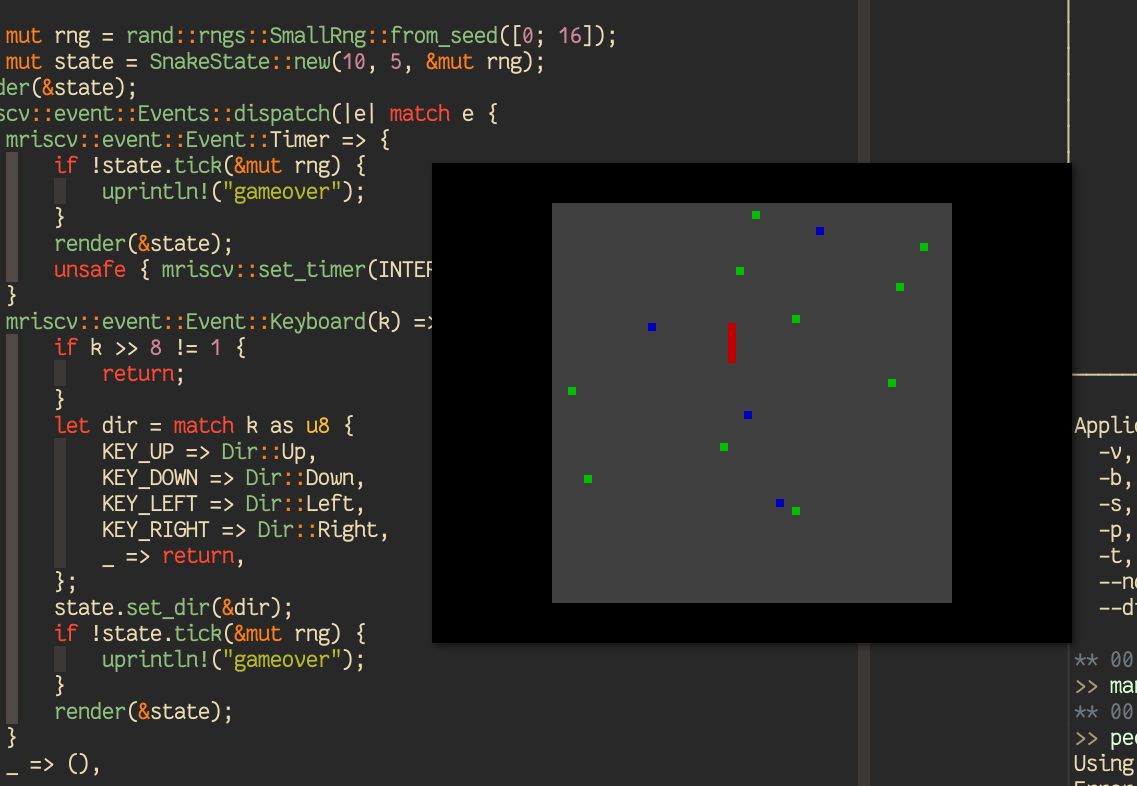- Minimalist code: it uses a classic five-stage, in-order pipeline architecture to implement RV32I ISA and major part of CSR Mode-M, while keeping the entire core code base tiny. Written cleanly from scratch and good for pedagogical purpose.
- core.sv: 1.2k lines
- csr.sv: 182 lines
- sim.cpp: 423 lines
- Practical approach: compared to other prevailing hobby/course projects, this project, despite its simplicity, still strives for a more "end-to-end" kind of approach. The core RTL is implemented with synthesizable SystemVerilog and is able to run realistic C program directly compiled by gcc and Rust program built by cargo/rustc.
- Self-contained: this repo contains a minimal system that works out of the box and allows building your own apps that run on the system. The only dependencies are Verilator (available on major Linux distributions) and SDL2 (optional, see Build). Makefiles will automatically pull the standard RISC-V toolchain to build binaries.
- It currently supports:
- Modularized five-stage pipeline: one can clearly see five stages and their data paths/control signals
- Realistic cache/memory model: the cache interface allows arbitrary cycles spent in instruction/data I/O by stalling the pipeline properly
- RV32I instructions
- Major CSR (machine mode only) registers
- Exceptions (illegal instructions, address misalignment, etc.)
- Interrupts (timer interrupt controlled by
mtime/mtimecmp, software interrupt triggered by writing to the memory-mapped register and external interrupt with anirqpin, which could be interfaced further or triggered directly in Verilator-based simulator UI by keyboard input. - Console output to the simulator through the memory-mapped register
- Video framebuffer to the simulator
- C/Rust application examples that work out of the box (
make -C ./appswill automatically build the gcc toolchain once, and a standard RV32I Rust toolchain is required to build the Rust apps)
- TODO: a semi-hosted example on Spartan-6/Artix-7
- Cache implementation or DDR RAM interfacing: this is more or less decoupled from the core implementation of the processor and it is also an interesting and deep topic by itself. I may want to work on a modularized cache implementation to integrate with the core in the future, but lacking this does not undermine the main purpose (and fun!) of this project.
- "M" extension: I left out multiplication/division for now as it is a very isolated extra feature and a good multiplier/divider may take substantial space in this tiny project. Both gcc and llvm are able to generate emulated code for multiplication/division, so this has lower priority.
- "A" extension: I plan to do some of the atomic operations (like
amoswap) as they may be useful in memory-mapped register manipulation. - Supervisor/User mode: I don't have any plan for this because it could significantly complicate the existing CSR implementation, which goes against the main purpose of this project.
- Verilator (required):
sudo apt-get install verilator(on Ubuntu). - SDL2 (optional, for video and keyboard input as interrupts, enabled by
ENABLE_SDL=1):sudo apt-get install libsdl2-dev(on Ubuntu).
cdto repo root.- Build RTL simulator:
make(console-only) orenv ENABLE_SDL=1 make sim(with video and keyboard) - Build C apps:
make -C ./apps - Build Rust apps (no need to run "Build C apps" if you just want to try out Rust apps):
- install rustup: https://rustup.rs/
- add rv32i toolchain:
rustup target add riscv32i-unknown-none-elf && cargo install cargo-binutils && rustup component add llvm-tools-preview - build examples:
make -C ./apps/mriscv-rs
If you're interested in the code, how the whole thing works together, or buliding a RISC-V system like this from scratch, checkout the tutorial.
- C Hello World:
./sim -l apps/hello.bin=0x100000 - C 8 Queens:
./sim -l apps/queens.bin=0x100000 - Rust Hello World:
./sim -l apps/mriscv-rs/hello.bin=0x100000(build withENABLE_SDL=1and use-vif want to test keyboard interrupts, press Esc to quit the UI) - Rust video test:
make clean; env ENABLE_SDL=1 make sim; ./sim -vl apps/mriscv-rs/video.bin=0x100000 - Rust Snake game:
make clean; env ENABLE_SDL=1 make sim; ./sim -vl apps/mriscv-rs/snake.bin=0x100000
0x00000000--0x00000fff: (reserved)0x00001000--0x00001000: UART_TXDATA0x00001001--0x00001fff: (reserved)0x00002000--0x00002007: MTIME0x00002008--0x0000200f: MTIMECMP0x00002010--0x00002013: MSIP (software interrupt, the lowest bit is used for msip, other 31 bits are hard-wired to 0)0x00002014--0x00002017: external interrupt control (write any non-zero value will clear last interrupt)0x00002018--0x00002fff: (reserved)0x00003000--0x00003003: input key states (the lowest 8 bits correspond to a USB scan code, the second 8 bits describe state: 1 for pressed/0 for released, other 16 bits are left for customized use)0x00003004--0x000fffff: (reserved)0x00100000--0x001fffff: program ("FLASH", 1MB)0x00200000--0x021fffff: RAM (32MB)0x02200000--0x0fffffff: (reserved)0x10000000--0x1004ffff: video framebuffer (320K, RGB222, 640x480, 1 byte per pixel)
